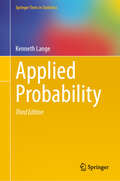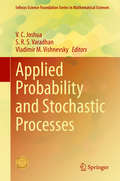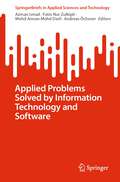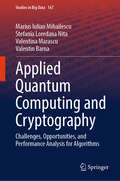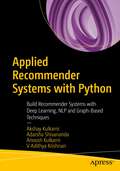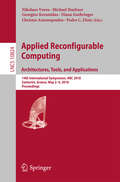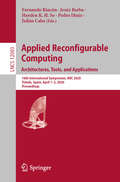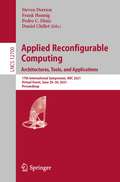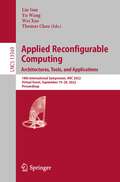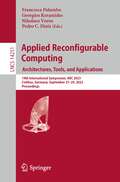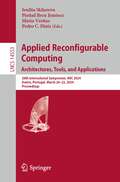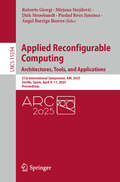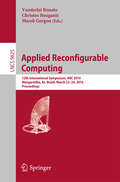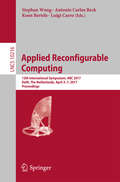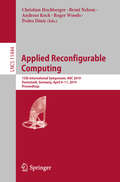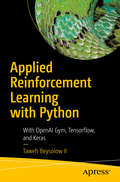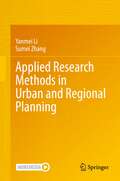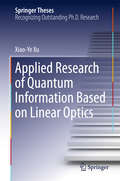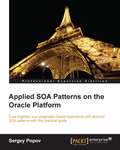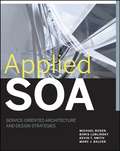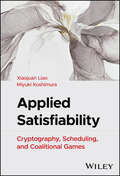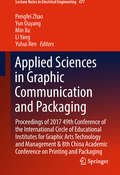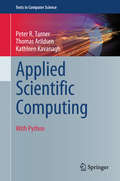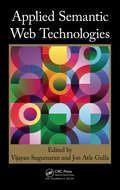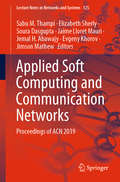- Table View
- List View
Applied Probability (Springer Texts in Statistics)
by Kenneth LangeApplied Probability presents a unique blend of theory and applications, with special emphasis on mathematical modeling, computational techniques, and examples from the biological sciences. Chapter 1 reviews elementary probability and provides a brief survey of relevant results from measure theory. Chapter 2 is an extended essay on calculating expectations. Chapter 3 deals with probabilistic applications of convexity, inequalities, and optimization theory. Chapters 4 and 5 touch on combinatorics and combinatorial optimization. Chapters 6 through 11 present core material on stochastic processes. If supplemented with appropriate sections from Chapters 1 and 2, there is sufficient material for a traditional semester-long course in stochastic processes covering the basics of Poisson processes, Markov chains, branching processes, martingales, and diffusion processes. This third edition includes new topics and many worked exercises. The new chapter on entropy stresses Shannon entropy and its mathematical applications. New sections in existing chapters explain the Chinese restaurant problem, the infinite alleles model, saddlepoint approximations, and recurrence relations. The extensive list of new problems pursues topics such as random graph theory omitted in the previous editions. Computational probability receives even greater emphasis than earlier. Some of the solved problems are coding exercises, and Julia code is provided. Mathematical scientists from a variety of backgrounds will find Applied Probability appealing as a reference. This updated edition can serve as a textbook for graduate students in applied mathematics, biostatistics, computational biology, computer science, physics, and statistics. Readers should have a working knowledge of multivariate calculus, linear algebra, ordinary differential equations, and elementary probability theory.
Applied Probability and Stochastic Processes (Infosys Science Foundation Series)
by Vladimir M. Vishnevsky V. C. Joshua S. R. S. VaradhanThis book gathers selected papers presented at the International Conference on Advances in Applied Probability and Stochastic Processes, held at CMS College, Kerala, India, on 7–10 January 2019. It showcases high-quality research conducted in the field of applied probability and stochastic processes by focusing on techniques for the modelling and analysis of systems evolving with time. Further, it discusses the applications of stochastic modelling in queuing theory, reliability, inventory, financial mathematics, operations research, and more. This book is intended for a broad audience, ranging from researchers interested in applied probability, stochastic modelling with reference to queuing theory, inventory, and reliability, to those working in industries such as communication and computer networks, distributed information systems, next-generation communication systems, intelligent transportation networks, and financial markets.
Applied Problems Solved by Information Technology and Software (SpringerBriefs in Applied Sciences and Technology)
by Andreas Öchsner Azman Ismail Mohd Amran Mohd Daril Fatin Nur ZulkipliThis book explores a dynamic landscape where cutting-edge technologies are revolutionizing various domains. This captivating book delves into the advancements in security, communication, and environmental management, highlighting their profound impact on society. The developments bridge the gap between human needs and technological innovation. Readers will uncover the fascinating world of IoT-driven devices that seamlessly integrate into our lives, ensuring enhanced safety and communication efficiency. This book is a must-read for technology enthusiasts, researchers, and anyone curious about the transformative power of technology in shaping our present and future.
Applied Quantum Computing and Cryptography: Challenges, Opportunities, and Performance Analysis for Algorithms (Studies in Big Data #167)
by Stefania Loredana Nita Marius Iulian Mihailescu Valentina Marascu Valentin BarnaThis book explores the dynamically developing areas of quantum computing and quantum cryptography. The book offers an in-depth examination of the possibilities and difficulties presented by these revolutionary technologies, with the goal of connecting abstract ideas with real-world applications. The book is an extremely helpful resource in the context of the upcoming quantum age. This highlights the importance of creating cryptographic techniques that can withstand the power of quantum computers to protect digital communications and vital infrastructures. This work makes a substantial contribution to the topic of cybersecurity by doing a comprehensive analysis of classical and quantum cryptography approaches, as well as actual implementations and performance evaluations. The book plays a vital role in providing valuable guidance to researchers, practitioners, and policymakers. It offers valuable insights that are necessary for effectively managing the shift towards quantum-secure technology and safeguarding the future security of digital information.
Applied Recommender Systems with Python: Build Recommender Systems with Deep Learning, NLP and Graph-Based Techniques
by Akshay Kulkarni Adarsha Shivananda Anoosh Kulkarni V Adithya KrishnanThis book will teach you how to build recommender systems with machine learning algorithms using Python. Recommender systems have become an essential part of every internet-based business today. You'll start by learning basic concepts of recommender systems, with an overview of different types of recommender engines and how they function. Next, you will see how to build recommender systems with traditional algorithms such as market basket analysis and content- and knowledge-based recommender systems with NLP. The authors then demonstrate techniques such as collaborative filtering using matrix factorization and hybrid recommender systems that incorporate both content-based and collaborative filtering techniques. This is followed by a tutorial on building machine learning-based recommender systems using clustering and classification algorithms like K-means and random forest. The last chapters cover NLP, deep learning, and graph-based techniques to build a recommender engine. Each chapter includes data preparation, multiple ways to evaluate and optimize the recommender systems, supporting examples, and illustrations. By the end of this book, you will understand and be able to build recommender systems with various tools and techniques with machine learning, deep learning, and graph-based algorithms.What You Will LearnUnderstand and implement different recommender systems techniques with PythonEmploy popular methods like content- and knowledge-based, collaborative filtering, market basket analysis, and matrix factorization Build hybrid recommender systems that incorporate both content-based and collaborative filteringLeverage machine learning, NLP, and deep learning for building recommender systems Who This Book Is ForData scientists, machine learning engineers, and Python programmers interested in building and implementing recommender systems to solve problems.
Applied Reconfigurable Computing. Architectures, Tools, and Applications: 14th International Symposium, Arc 2018, Santorini, Greece, May 2-4, 2018, Proceedings (Lecture Notes In Computer Science #10824)
by Pedro C. Diniz Diana Goehringer Michael Huebner Nikolaos Voros Georgios Keramidas Christos AntonopoulosThis book constitutes the proceedings of the 14th International Conference on Applied Reconfigurable Computing, ARC 2018, held in Santorini, Greece, in May 2018. <P><P> The 29 full papers and 22 short presented in this volume were carefully reviewed and selected from 78 submissions. In addition, the volume contains 9 contributions from research projects. The papers were organized in topical sections named: machine learning and neural networks; FPGA-based design and CGRA optimizations; applications and surveys; fault-tolerance, security and communication architectures; reconfigurable and adaptive architectures; design methods and fast prototyping; FPGA-based design and applications; and special session: research projects.
Applied Reconfigurable Computing. Architectures, Tools, and Applications: 16th International Symposium, ARC 2020, Toledo, Spain, April 1–3, 2020, Proceedings (Lecture Notes in Computer Science #12083)
by Pedro Diniz Fernando Rincón Jesús Barba Hayden K. H. So Julián CabaThis book constitutes the proceedings of the 16th International Symposium on Applied Reconfigurable Computing, ARC 2020, held in Toledo, Spain, in April 2020. The 18 full papers and 11 poster presentations presented in this volume were carefully reviewed and selected from 40 submissions. The papers are organized in the following topical sections: design methods & tools; design space exploration & estimation techniques; high-level synthesis; architectures; applications.
Applied Reconfigurable Computing. Architectures, Tools, and Applications: 17th International Symposium, ARC 2021, Virtual Event, June 29–30, 2021, Proceedings (Lecture Notes in Computer Science #12700)
by Pedro C. Diniz Frank Hannig Steven Derrien Daniel ChilletThis book constitutes the proceedings of the 17th International Symposium on Applied Reconfigurable Computing, ARC 2021, held as a virtual event, in June 2021. The 14 full papers and 11 short presentations presented in this volume were carefully reviewed and selected from 40 submissions. The papers cover a broad spectrum of applications of reconfigurable computing, from driving assistance, data and graph processing acceleration, computer security to the societal relevant topic of supporting early diagnosis of Covid infectious conditions.
Applied Reconfigurable Computing. Architectures, Tools, and Applications: 18th International Symposium, ARC 2022, Virtual Event, September 19–20, 2022, Proceedings (Lecture Notes in Computer Science #13569)
by Yu Wang Wei Xue Lin Gan Thomas ChauThis book constitutes the proceedings of the 18th International Symposium on Applied Reconfigurable Computing, ARC 2022, held as a virtual event, in September 2022. The 13 full papers presented in this volume were reviewed and selected from 16 submissions. The papers cover a broad spectrum of applications of reconfigurable computing, from driving assistance, data and graph processing acceleration, computer security to the societal relevant topic of supporting early diagnosis of Covid infectious conditions.
Applied Reconfigurable Computing. Architectures, Tools, and Applications: 19th International Symposium, ARC 2023, Cottbus, Germany, September 27–29, 2023, Proceedings (Lecture Notes in Computer Science #14251)
by Pedro C. Diniz Nikolaos Voros Georgios Keramidas Francesca PalumboThis book constitutes the proceedings of the 19th International Symposium on Applied Reconfigurable Computing, ARC 2023, which was held in Cottbus, Germany, in September 2023.The 18 full papers presented in this volume were reviewed and selected from numerous submissions. The proceedings also contain 4 short PhD papers. The contributions were organized in topical sections as follows: Design methods and tools; applications; architectures; special session: near and in-memory computing; and PhD forum papers.
Applied Reconfigurable Computing. Architectures, Tools, and Applications: 20th International Symposium, ARC 2024, Aveiro, Portugal, March 20–22, 2024, Proceedings (Lecture Notes in Computer Science #14553)
by Pedro C. Diniz Iouliia Skliarova Piedad Brox Jiménez Mário VéstiasThis LNCS conference volume constitutes the proceedings of the 20th International Symposium, ARC 2024, in Aveiro, Portugal, in March 2024. The 16 full papers together with 5 papers from the technical program included in this volume were carefully reviewed and selected from 24 submissions. The conference focuses on the application and development of reconfigurable computing techniques, fault-tolerance, data, and graph processing acceleration to computer security.
Applied Reconfigurable Computing. Architectures, Tools, and Applications: 21st International Symposium, ARC 2025, Seville, Spain, April 9–11, 2025, Proceedings (Lecture Notes in Computer Science #15594)
by Roberto Giorgi Dirk Stroobandt Piedad Brox Jiménez Mirjana Stojilović Ángel Barriga BarrosThis book constitutes the proceedings of the 21st International Symposium on Applied Reconfigurable Computing. Architectures, Tools, and Applications, ARC 2025, held in Seville, Spain, during April 9–11, 2025. The 12 full papers presented in this book together with 1 short paper from the technical program were carefully reviewed and selected from 40 submissions.ARC 2025 covers a wide range of topics, including hardware acceleration, security and fault tolerance, energy-efficient architectures, and emerging applications in artificial intelligence and high-performance computing. The symposium fostered collaboration and pushed the boundaries of state-of-the-art research.
Applied Reconfigurable Computing: 12th International Symposium, ARC 2016 Mangaratiba, RJ, Brazil, March 22–24, 2016 Proceedings (Lecture Notes in Computer Science #9625)
by Vanderlei Bonato Christos Bouganis Marek GorgonThis book constitutesthe refereed proceedings of the 12th International Symposium on AppliedReconfigurable Computing, ARC 2016, held in Rio de Janeiro, Brazil, in March2016. The 20 full papers presentedin this volume were carefully reviewed and selected from 47 submissions. Theyare organized in topical headings named: video and image processing; fault-tolerantsystems; tools and architectures; signal processing; and multicore systems. In addition, the bookcontains 3 invited papers and 8 poster papers on funded RD running and completed projects.
Applied Reconfigurable Computing: 13th International Symposium, ARC 2017, Delft, The Netherlands, April 3-7, 2017, Proceedings (Lecture Notes in Computer Science #10216)
by Luigi Carro Antonio Carlos Beck Koen Bertels Stephan WongThis book constitutes the refereed proceedings of the 13th International Symposium on Applied Reconfigurable Computing, ARC 2017, held in Delft, The Netherlands, in April 2017. The 17 full papers and 11 short papers presented in this volume were carefully reviewed and selected from 49 submissions. They are organized in topical sections on adaptive architectures, embedded computing and security, simulation and synthesis, design space exploration, fault tolerance, FGPA-based designs, neural neworks, and languages and estimation techniques.
Applied Reconfigurable Computing: 15th International Symposium, ARC 2019, Darmstadt, Germany, April 9–11, 2019, Proceedings (Lecture Notes in Computer Science #11444)
by Roger Woods Christian Hochberger Brent Nelson Andreas Koch Pedro DinizThis book constitutes the proceedings of the 15th International Symposium on Applied Reconfigurable Computing, ARC 2019, held in Darmstadt, Germany, in April 2019. The 20 full papers and 7 short papers presented in this volume were carefully reviewed and selected from 52 submissions. In addition, the volume contains 1 invited paper. The papers were organized in topical sections named: Applications; partial reconfiguration and security; image/video processing; high-level synthesis; CGRAs and vector processing; architectures; design frameworks and methodology; convolutional neural networks.
Applied Reinforcement Learning with Python: With OpenAI Gym, Tensorflow, and Keras
by Taweh Beysolow IIDelve into the world of reinforcement learning algorithms and apply them to different use-cases via Python. This book covers important topics such as policy gradients and Q learning, and utilizes frameworks such as Tensorflow, Keras, and OpenAI Gym. Applied Reinforcement Learning with Python introduces you to the theory behind reinforcement learning (RL) algorithms and the code that will be used to implement them. You will take a guided tour through features of OpenAI Gym, from utilizing standard libraries to creating your own environments, then discover how to frame reinforcement learning problems so you can research, develop, and deploy RL-based solutions. What You'll LearnImplement reinforcement learning with Python Work with AI frameworks such as OpenAI Gym, Tensorflow, and KerasDeploy and train reinforcement learning–based solutions via cloud resourcesApply practical applications of reinforcement learning Who This Book Is For Data scientists, machine learning engineers and software engineers familiar with machine learning and deep learning concepts.
Applied Research Methods in Urban and Regional Planning
by Yanmei Li Sumei ZhangThis book introduces the fundamentals of research methods and how they apply to the discipline of urban and regional planning. Written at a level appropriate for upper-level undergraduate and beginning master’s level students, the text fills a gap in the literature for textbooks on urban planning. Additionally, the book can be used as a reference for planning practitioners and researchers when analyzing quantitative and qualitative data in urban and regional planning and related fields.The volume does not assume advanced knowledge of mathematical formulas. Rather, it begins with the essentials of research methods, such as the identification of the research problems in planning, the literature review, data collection and presentation, descriptive data analysis, and report of findings. Its discipline-specific topics include field research methods, qualitative data analysis, economic and demographic analysis, evaluation research, and methods in sub-disciplines such as land use planning, transportation planning, environmental planning, and housing analysis. Designed with instruction in mind, this book features downloadable materials, including learning outcomes, chapter highlights, chapter review questions, datasets, and certain Excel models. Students will be able to download review questions to enhance the learning process and datasets to practice methods.
Applied Research of Quantum Information Based on Linear Optics (Springer Theses)
by Xiao-Ye XuThis thesis reports on outstanding work in two main subfields of quantum information science: one involves the quantum measurement problem, and the other concerns quantum simulation. The thesis proposes using a polarization-based displaced Sagnac-type interferometer to achieve partial collapse measurement and its reversal, and presents the first experimental verification of the nonlocality of the partial collapse measurement and its reversal. All of the experiments are carried out in the linear optical system, one of the earliest experimental systems to employ quantum communication and quantum information processing. The thesis argues that quantum measurement can yield quantum entanglement recovery, which is demonstrated by using the frequency freedom to simulate the environment. Based on the weak measurement theory, the author proposes that white light can be used to precisely estimate phase, and effectively demonstrates that the imaginary part of the weak value can be introduced by means of weak measurement evolution. Lastly, a nine-order polarization-based displaced Sagnac-type interferometer employing bulk optics is constructed to perform quantum simulation of the Landau-Zener evolution, and by tuning the system Hamiltonian, the first experiment to research the Kibble-Zurek mechanism in non-equilibrium kinetics processes is carried out in the linear optical system.
Applied SOA Patterns on the Oracle Platform
by Sergey PopovApplied SOA Patterns on the Oracle Platform is aimed at architects practicing SOA or traditional integration, and also at technical team leaders implementing Oracle Fusion under SCRUM or WF methodology.
Applied SOA: Service-Oriented Architecture and Design Strategies
by Mike Rosen Boris Lublinsky Kevin T. Smith Marc J. BalcerEndorsed by all major vendors (Microsoft, Oracle, IBM, and SAP), SOA has quickly become the industry standard for building next-generation software; this practical guide shows readers how to achieve the many benefits of SOA Begins with a look at the architectural principles needed to create successful applications and then goes on to examine the process for designing services and SOA implementations Each stage of the design process has an accompanying chapter that walks readers through the details and provides helpful tips, techniques, and examples The author team of SOA practitioners also provides two unique, comprehensive, end-to-end case studies illustrating the architectural and design techniques presented in the book
Applied Satisfiability: Cryptography, Scheduling, and Coalitional Games
by Xiaojuan Liao Miyuki KoshimuraApply satisfiability to a range of difficult problems The Boolean Satisfiability Problem (SAT) is one of the most famous and widely-studied problems in Boolean logic. Optimization versions of this problem include the Maximum Satisfiability Problem (MaxSAT) and its extensions, such as partial MaxSAT and weighted MaxSAT, which assess whether, and to what extent, a solution satisfies a given set of problems. Numerous applications of SAT and MaxSAT have emerged in fields related to logic and computing technology. Applied Satisfiability: Cryptography, Scheduling, and Coalitional Games outlines some of these applications in three specific fields. It offers a huge range of SAT applications and their possible impacts, allowing readers to tackle previously challenging optimization problems with a new selection of tools. Professionals and researchers in this field will find the scope of their computational solutions to otherwise intractable problems vastly increased. Applied Satisfiability readers will also find: Coding and problem-solving skills applicable to a variety of fieldsSpecific experiments and case studies that demonstrate the effectiveness of satisfiability-aided methodsChapters covering topics including cryptographic key recovery, various forms of scheduling, coalition structure generation, and many more Applied Satisfiability is ideal for researchers, graduate students, and practitioners in these fields looking to bring a new skillset to bear in their studies and careers.
Applied Sciences in Graphic Communication and Packaging: Proceedings of 2017 49th Conference of the International Circle of Educational Institutes for Graphic Arts Technology and Management & 8th China Academic Conference on Printing and Packaging (Lecture Notes in Electrical Engineering #477)
by Min Xu Li Yang Yun Ouyang Pengfei Zhao Yuhui RenThis book includes a selection of reviewed papers presented at the 49th Conference of the International Circle of Educational Institutes for Graphic Arts Technology and Management & 8th China Academic Conference on Printing and Packaging, which was held on May 14-16, 2017 in Beijing, China. The conference was jointly organized by the Beijing Institute of Graphic Communication, China Academy of Printing Technology, and International Circle of Educational Institutes for Graphic Arts Technology and Management. With eight keynote talks and 200 presented papers on graphic communication and packaging technologies, the event attracted more than 400 scientists. The proceedings cover the latest advances in color science and technology; image processing technology; digital media technology; digital process management technology in packaging; packaging, etc. , and will be of interest to university researchers, R&D engineers and graduate students in the graphic arts, packaging, color science, image science, material science, computer science, digital media and network technology.
Applied Scientific Computing: With Python (Texts in Computer Science)
by Peter R. Turner Thomas Arildsen Kathleen KavanaghThis easy-to-understand textbook presents a modern approach to learning numerical methods (or scientific computing), with a unique focus on the modeling and applications of the mathematical content. Emphasis is placed on the need for, and methods of, scientific computing for a range of different types of problems, supplying the evidence and justification to motivate the reader. Practical guidance on coding the methods is also provided, through simple-to-follow examples using Python.Topics and features: provides an accessible and applications-oriented approach, supported by working Python code for many of the methods; encourages both problem- and project-based learning through extensive examples, exercises, and projects drawn from practical applications; introduces the main concepts in modeling, python programming, number representation, and errors; explains the essential details of numerical calculus, linear, and nonlinear equations, including the multivariable Newton method; discusses interpolation and the numerical solution of differential equations, covering polynomial interpolation, splines, and the Euler, Runge–Kutta, and shooting methods; presents largely self-contained chapters, arranged in a logical order suitable for an introductory course on scientific computing.Undergraduate students embarking on a first course on numerical methods or scientific computing will find this textbook to be an invaluable guide to the field, and to the application of these methods across such varied disciplines as computer science, engineering, mathematics, economics, the physical sciences, and social science.
Applied Semantic Web Technologies
by Vijayan Sugumaran Jon Atle GullaThe rapid advancement of semantic web technologies, along with the fact that they are at various levels of maturity, has left many practitioners confused about the current state of these technologies. Focusing on the most mature technologies, Applied Semantic Web Technologies integrates theory with case studies to illustrate the history, current st
Applied Soft Computing and Communication Networks: Proceedings of ACN 2019 (Lecture Notes in Networks and Systems #125)
by Jemal H. Abawajy Jimson Mathew Sabu M. Thampi Jaime Lloret Mauri Soura Dasgupta Elizabeth Sherly Evgeny KhorovThis book constitutes best selected research papers presented at the International Applied Soft Computing and Communication Networks (ACN 2019) held in Trivandrum, Kerala, India during December 18 – 21, 2019. The papers are organized in topical sections on real time and multimedia communications, security and privacy, network management and software-defined networks, Internet of Things (IoT) and cyber-physical systems, intelligent distributed systems, mobile computing and vehicle communications, surveillance networks and visual intelligence, and emerging topics. The book is a reference for researchers and scientists engaged in various fields of intelligent systems.
